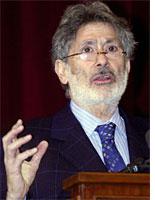Procrustes Stretched
"intuition and imagination and intelligence"
Here we are: Religion and Ethics (Religion, Philosophy and the discussion of right and wrong.)
Opinion: In the Israeli-Palestinian debate, you might be wrong. So be humble.
By Shadi Hamid
Columnist and Editorial Board member
"the Palestinians as “victims of the victims,”"
"humility involves the recognition that the truth itself is more complicated than it might first appear"
Obit
Edward Said
By Christopher Hitchens
Sept 26, 2003

 slate.com
slate.com
It's a lot of reading and would take some time to digest the issues and points made here. I wish I could say more, but it will have to wait. I hope a few people read the two links and become motivated to a serious discussion of point issued in the WAPO article and especially on Christopher Hitchens' Obit for his friend.
Opinion: In the Israeli-Palestinian debate, you might be wrong. So be humble.
By Shadi Hamid
Columnist and Editorial Board member
"the Palestinians as “victims of the victims,”"
"humility involves the recognition that the truth itself is more complicated than it might first appear"
Intellectual humility is a trait and a practice that allows one to accept their own limitations. Even if we think we are right, it entails holding open the possibility that we might be wrong. But on a deeper level, humility involves the recognition that the truth itself is more complicated than it might first appear.
The search for truth, even if one finds it, should not involve rigidity. We are all a product of our environments. When it comes to Israel and Palestine in particular, we bring our own preconceptions to any debate — our own selective read of history and our own developed sense of injustice. This is not about a disagreement over facts; it’s about how to interpret them. My hope is that more Americans will understand this, considering how much we disagree with one another over our own founding as a nation.
Obit
Edward Said
By Christopher Hitchens
Sept 26, 2003

A valediction for Edward Said.
The loss of Professor Edward Said, after an arduous battle with demoralizing illness that he bore very bravely, will be unbearable for his family,...
His feeling for the injustice done to Palestine was, in the best sense of this overused term, a visceral one. He simply could not reconcile himself to the dispossession of a people or to the lies and evasions that were used to cover up this offense. He was by no means simple-minded or one-sided about this: In a public dialogue with Salman Rushdie 15 years ago, he described the Palestinians as “victims of the victims,” an ironic formulation that hasn’t been improved upon. But nor did he trust those who introduced pseudo-complexities as a means of perpetuating the status quo. I know a shocking number of people who find that they can be quite calm about the collective punishment of Palestinians yet become wholly incensed at the symbolic stone he once threw—from Lebanon!
Personally, I preferred his joint enterprise with Daniel Barenboim to provide musical training for Israeli and Palestinian children. But for Edward, injustice was to be rectified, not rationalized. I think that it was, for him, surpassingly a matter of dignity. People may lose a war or a struggle or be badly led or poorly advised, but they must not be humiliated or treated as alien or less than human. It was the downgrading of the Palestinians to the status of a “problem” (and this insult visited upon them in their own homeland) that aroused his indignation. That moral energy, I am certain, will outlive him.
I knew and admired him for more than a quarter-century, and I hope I will not be misunderstood if I say that his moral energy wasn’t always matched by equivalent political judgment. Indeed, it should be no criticism of anyone to say that politics isn’t their best milieu, especially if the political life has been forced upon them. Edward had a slight tendency to self-pity, and the same chord was struck even in the best of his literary work, which often expressed a too-highly developed sense of injury and victimhood. (I am thinking of certain passages in his Orientalism and some of the essays in Culture and Imperialism as well.) He was sometimes openly alarmed at the use made of his scholarship by younger academic poseurs who seemed to despise the classical canon of literature that he so much revered. Yet he was famously thin-skinned and irascible, as I have good reason to remember, if any criticism became directed at himself.
Some of that criticism was base and outrageous and sordidly politicized—I have just finished reading the obituary in the New York Times, which in a cowardly way leaves open the question as to whether Edward, or indeed any other Palestinian, lost a home in the tragedy of 1947-48—but much of it deserved more patience than he felt he had to spare. And he was capable of stooping to mere abuse when attacking other dissidents—particularly other Arab dissidents, and most particularly Iraqi and Kurdish ones—with whom he did not agree. I simply had to stop talking to him about Iraq over the past two years. He could only imagine the lowest motives for those in favor of regime change in Baghdad, and he had a vivid tendency to take any demurral as a personal affront.
It's a lot of reading and would take some time to digest the issues and points made here. I wish I could say more, but it will have to wait. I hope a few people read the two links and become motivated to a serious discussion of point issued in the WAPO article and especially on Christopher Hitchens' Obit for his friend.

